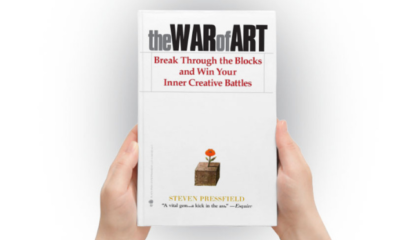Success Advice
A List of the Best Books to Read to Achieve Financial Freedom
One of the best ways to successfully walk the path to financial freedom is to learn from those who have already walked it

Forbes suggests that there are almost 3,000 billionaires in the world today. But nowadays, that club has become more accessible than ever before. While not everyone who starts out on the path to financial freedom will reach their intended destination, there are a number of ways you can increase your chances of becoming financially free.
One of the best ways to increase your chances of becoming a self-made millionaire is by introducing helpful habits into your daily routine. One habit that serves the dual purpose of motivating you and educating you is dedicating an hour a day to reading.
While this is enjoyable and an easy enough activity to introduce into your life, it can be hard knowing where to start when it comes to building your book collection. Whether you want to achieve success through career progression, investing, or entrepreneurship, here are some great books that will help reprogram your mind and teach you how to make money.
Autobiographies for Financial Freedom
One of the best ways to successfully walk the path to financial freedom is to learn from those who have already walked it. Thankfully, learning from the best entrepreneurs, business owners, and wealth creators is easy enough seeing as many of them turn to penning the story of their lives through autobiographies.
Reading about the lives of the rich and famous will offer financial tips as well as psychological changes that you can make to your mindset.
Top books from successful entrepreneurs
- Richard Branson – Losing My Virginity
- Alan Sugar – What You See Is What You Get
- Phil Knight – Shoe Dog
- iWoz – Steve Wozniak
- Pour Your Heart Into It – Howard Schultz
Self-belief and Mindset Books for Financial Freedom
Many people’s biggest barrier to achieving success is their own mind. Building up the confidence and self-belief to actively believe that you can achieve anything is possibly the hardest part of your journey to financial success.
Making changes to your life and thinking can be one of the hardest challenges when chasing financial freedom. But fortunately, there’s never been as much talk and literature about self-belief, spirituality, and positive thinking as there is today.
Top books about self-belief and positive mindset
- The Mountain Is You: Transforming Self-Sabotage Into Self-Mastery – Brianna Wiest
- Six Pillars Of Self-Esteem – Nathaniel Branden
- Atomic Habits – James Clear
- Ikigai: The Japanese Secret To A Long And Happy Life – Héctor García
- Manifest – Roxie Nafousi
Business Advice Books for Financial Freedom
If you’re the entrepreneurial type, you might be about to embark on a business journey with the aim of a multi-million dollar exit. Or maybe you’ve already tried your hand at building a business empire and things didn’t quite go to plan. If this sounds familiar, don’t give up just yet. It may be that you just need a helping hand to get there.
When it comes to business advice, you first need to sit down and be honest with yourself. Ask yourself what you are good at and what you need help with. That way you can tailor your reading to the areas where your knowledge is limited. Alternatively, these may be the areas that you look to solve through hiring and outsourcing, while you double down on your strengths.
Top books about business
- Ogilvy On Advertising – David Ogilvy
- $100m Leads: How To Get Strangers To Want To Buy Your Stuff – Alex Hormozi
- The Diary Of A Ceo: The 33 Laws Of Business And Life – Steven Bartlett
- Your Next Five Moves: Master The Art Of Business Strategy – Patrick Bet-David
- The Lean Startup: How Constant Innovation Creates Radically Successful Businesses – Eric Ries
Investment Books for Financial Freedom
One of the most attractive ways to achieve financial freedom is through investing. While it may not require as much work as building a business, it does require a lot of learning. So what better way to start than accumulating knowledge from the vast amount of investment books that are out there?
Whether you’d rather hear how those before made it like Warren Buffett, or you want up-to-date investment tips from the best investment brains of the 21st century, you’ll find an investment guide that will meet you where you’re at in your investment journey.
Top books about investing
- The Snowball: Warren Buffett And The Business Of Life – Alice Schroeder
- Girls That Invest: Your Guide To Financial Independence Through Shares And Stocks – Simran Kaur
- Investing For Dummies – Tony Levene
- Stock Market Explained: A Beginner’s Guide To Investing And Trading In The Modern Stock Market – Ardi Aaziznia
- One Up On Wall Street: How To Use What You Already Know To Make Money In The Market – Peter Lynch
Achieving financial freedom may seem like a distant dream, but with the right mindset and guidance, it becomes a tangible goal. While the journey will require hard work, dedication, and perhaps some trial and error, the key is equipping yourself with the right tools and knowledge to forge your own path.
Books are one of the most accessible yet powerful resources available—they offer not just advice, but a roadmap paved by those who have already found success.
Whether you’re looking for inspiration from the stories of self-made millionaires, seeking to reshape your mindset, or diving deep into business and investing strategies, the resources listed here can serve as a springboard to a future of unlimited possibilities.
So, take a step today, invest in your education, and watch how small changes can lead to monumental shifts in your financial journey.
Business
DIY vs Delegate: The Real Reason You’re Burned Out
Doing everything yourself feels productive until it quietly becomes the reason your business can’t scale.

You know that moment when your brain has 37 tabs open and every tab is screaming “urgent”? That’s the DIY life when it starts to crack. (more…)
Change Your Mindset
The Hidden Reason You Can’t Stay Consistent
If motivation keeps failing you, the real issue isn’t discipline. It’s the identity shaping your habits and long-term success.

Success often looks like a time-management problem. You buy a planner, set reminders, and hope that next week will be different. For a few days, it works. Then stress hits, motivation drops, and old patterns return. (more…)
Business
9 Modern Workplace Solutions That Instantly Boost Productivity
Modern workplace solutions, smart tech, and flexible systems help teams work faster, stay focused, and drive higher productivity without burnout.

Contemporary workplaces continue to adapt to new demands and expectations. Employees seek efficiency, comfort, and flexibility in their work environments. Modern workplace solutions address these needs through technology, thoughtful design, and supportive practices. (more…)
Business
How Digital Privacy Became a New Success Metric
In a world where trust drives revenue, digital privacy has quietly become the competitive edge most businesses still underestimate.

Success today is no longer measured only by revenue, productivity, or growth. In a fully digital world, privacy has become a defining factor of long-term success. Every online interaction creates data, and every piece of data creates responsibility. (more…)
-

 Business4 weeks ago
Business4 weeks agoEntrepreneur’s Guide to Pay Stubs: Why Freelancers and Small Business Owners Need a Smart Generator
-

 Business3 weeks ago
Business3 weeks agoThe Salary Shift Giving UK Employers An Unexpected Edge
-

 Scale Your Business3 weeks ago
Scale Your Business3 weeks ago5 Real Ways to Grow Your User Base Fast
-

 Business3 weeks ago
Business3 weeks agoThe Simple Security Stack Every Online Business Needs
-

 Finances3 weeks ago
Finances3 weeks agoWhy Financial Stress Is One of the Biggest Barriers to Personal Growth
-

 Business3 weeks ago
Business3 weeks agoWhy Smart FMCG Entrepreneurs Outsource What They Can’t Automate
-

 Did You Know3 weeks ago
Did You Know3 weeks agoThe SEO Traps Even Experienced Marketers Fall Into
-

 Business2 weeks ago
Business2 weeks agoWhat Every Business Owner Should Know Before Investing in API Integration




























